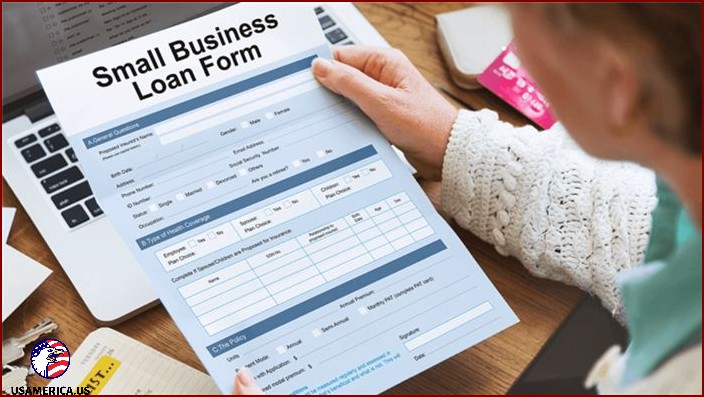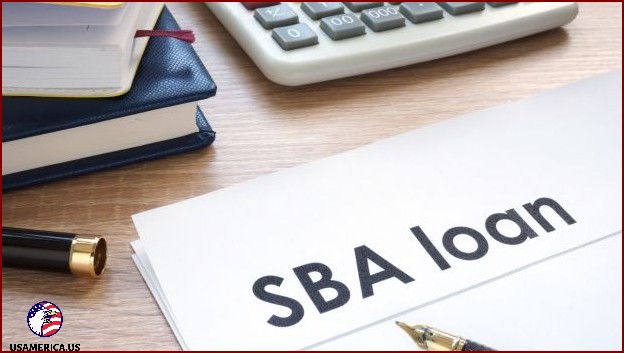Discover the Secrets to Obtaining a Small Business Loan
Are you ready to step into the world of entrepreneurship? Do you have a brilliant business idea, but lack the necessary funds to bring it to life? No need to fret! I am here to guide you through the process of securing a small business loan.
First things first, let’s dive into the ins and outs of this topic. What exactly is a small business loan? In simple terms, it is a sum of money provided by a financial institution to help you kickstart or expand your business. This loan can be used for purchasing equipment, stocking inventory, or even hiring staff members. It’s like a golden key that unlocks the door to your dreams.
Now, you might be wondering, How do I go about obtaining a small business loan? Well, my friend, I’m about to reveal some insider tips that will increase your chances of success.
Step one: Get your paperwork in order. This involves organizing all the necessary documents, such as your business plan, financial statements, and personal credit history. Remember, first impressions matter, so it’s essential to present a well-prepared and professional loan application.
Step two: Choose the right lender. There are various options available when it comes to lenders, including traditional banks, credit unions, and online lenders. Take your time to research and find the one that best suits your specific business needs. Remember, the right lender can be your greatest ally in this journey.
Step three: Have a solid repayment plan. Lenders want to see that you have a clear strategy for paying back the loan. Take the time to evaluate your business’s projected cash flow and create a realistic repayment schedule. This will demonstrate your commitment and reliability to the lender.
Step four: Prepare for the loan interview. This may sound intimidating, but it’s merely an opportunity for you to showcase your passion and knowledge about your business. Be prepared to answer questions about your industry, competitors, and growth potential. Confidence is key!
Step five: Keep exploring your options. If one lender rejects your loan application, don’t lose hope. There are plenty of fish in the sea. Take the feedback you receive and use it to improve your chances with the next lender. Persistence and adaptability are crucial in the pursuit of a small business loan.
So there you have it, my friend! By following these insider tips, you are well on your way to obtaining that coveted small business loan. Remember, be prepared, choose wisely, plan meticulously, and never give up. Your entrepreneurial dreams are within reach!

If you own a small business, you’ve probably thought about getting a loan to help fund your operations. But how do you know if you qualify for a small business loan? And what’s the process like? In this complete guide on getting a loan for your small business, I’ll cover everything you need to know, including some helpful tips from industry experts. Let’s begin our journey to successfully securing that loan for your venture!
Contents
- 1 Steps to Obtain a Small Business Loan
- 1.1 1. Your business plan
- 1.2 2. A good credit score
- 1.3 3. Collateral
- 1.4 4. Have a good history of repaying loans
- 1.5 5. Choose the right loan
- 1.6 6. Find the right lender
- 1.7 7. Show your financial statements
- 1.8 8. Finish the application process
- 1.9 9. Get ready for the underwriting process
- 1.10 10. Team up with a professional
- 2 Comparing Factors for Small Business Loan Applications
- 3 What Does Small Business Loan Mean?
- 4 Are You Eligible for a Loan for Your Small Business?
- 5 What Other Options Do I Have Besides a Small Business Loan?
- 6 Are Small Business Loans Difficult to Obtain?
- 7 Which SBA Loan is the Easiest to Obtain?
- 8 Getting Your First Business Loan: Is It Possible?
Steps to Obtain a Small Business Loan

So you’ve got your business plan and you’re all set to apply for a business loan. Before you go ahead with your application, take a look at these helpful tips…
1. Your business plan
Havin’ a business plan is super important when you’re applyin’ for a small business loan. Your plan’ll show the lenders how you’re gonna use the loan and how you’re gonna pay it back. A good business plan also includes estimatin’ the finances for your business.
2. A good credit score
If you’ve got a good credit score, you’ll have a better chance of gettin’ a lower interest rate on your loan. This is because lenders see you as less of a risky borrower. If your credit score isn’t so great, you can still get a loan, but the interest rate will be higher and you’ll have fewer options for lenders.
3. Collateral
When you borrow money, you might have to offer something valuable as a guarantee. This is called collateral. It can be your house, car, or other valuable things like stocks, bonds, or jewelry. Providing collateral makes it more likely for you to get a loan, but it’s not always necessary.
4. Have a good history of repaying loans
If you have a history of paying back loans on time, you have a better chance of getting approved for a small business loan. Lenders want to see that you are responsible and can repay your debts.
5. Choose the right loan
There are many types of loans available for small businesses. It’s important to apply for a loan that fits your business’s specific needs. For example, if you need money for equipment, you should apply for an equipment loan.
6. Find the right lender
When it comes to finding the right lender, it’s important to consider a few things. Think about interest rates, repayment terms, and fees before you make a decision. You might also want to think about whether you prefer working with a bank or a different type of lender.
7. Show your financial statements
Financial statements give lenders an idea of how much money your business makes and how much debt it has. These statements will help the lender figure out if you can pay back the loan. Financial statements include things like balance sheets, income statements, business bank statements, and cash flow statements.
8. Finish the application process
9. Get ready for the underwriting process
When lenders evaluate your loan application, they go through a process called underwriting. During this process, they review your credit score, business history, and financial statements. To be prepared, make sure you have all the necessary documents, such as your business license and tax returns.
10. Team up with a professional
Applying for a loan can be complicated, especially since there are different types of loans available. If you’re unsure of where to start or need assistance with the application, consider working with a professional loan advisor. They can help you find the best loan for your business and guide you through each step of the application process.
Comparing Factors for Small Business Loan Applications
So, here’s a super helpful table that breaks down all the important stuff you need to think about when you’re applying for a business loan. Use it like a checklist as you go through the loan application process. It’ll help you make smart decisions and find the perfect financing for your business:
What Does Small Business Loan Mean?

Definition and Purpose
Let me explain what this means and why it’s important. There are a few different reasons why a business might need financial assistance.
- Startup Costs: These are the expenses that a new business has to cover when they’re getting started. It could be things like buying equipment, renting a space, or hiring employees. Financial support can help with these initial costs and make it easier to launch the business.
- Working Capital: This refers to the funds that a business needs to keep things running smoothly on a day-to-day basis. It includes things like paying employees, buying supplies, and managing cash flow. Getting financial help can ensure that a business has enough working capital to keep things running efficiently.
- Inventory Purchases: For businesses that sell products, it’s important to have enough inventory on hand. This is especially true during busy seasons when there’s a surge in sales. Financial assistance can help businesses buy the inventory they need to meet customer demand.
- Equipment Acquisition: Sometimes, businesses need to invest in machinery, technology, or equipment to improve their operations. This could be anything from buying new computers to upgrading manufacturing equipment. Getting financial support can make it easier for businesses to acquire the necessary equipment.
Lender Options
Now, let’s talk about who can provide this financial assistance. There are different lenders you can turn to, each with their own terms and conditions.
- Banks: These are traditional lenders that offer loans to businesses. They often have lower interest rates, but they also have stricter eligibility criteria. This means you have to meet certain requirements to qualify for a loan from a bank.
When it comes to borrowing money, there are different options available to you. Let me break them down for you:
Credit Unions: These are organizations that aren’t driven by profit and they offer favorable interest rates and personalized service. It’s like having a financial institution that cares about you.
Online Lenders: These are modern platforms that make the borrowing process quick and easy. You can apply online and get faster approval times. However, keep in mind that they might have higher interest rates compared to other options.
Now let’s talk about the types of loans you can choose from:
Term Loans: These are loans that you repay over a set period of time. They come with a fixed or variable interest rate, depending on what works best for you.
Line of Credit: This is a revolving credit option that allows businesses to borrow up to a certain limit. The best part is that you only pay interest on the amount you borrow, which gives you the flexibility to manage your finances.
Equipment Financing: If you’re looking to purchase equipment for your business, this type of loan is specifically designed for that. The equipment itself serves as collateral, so you can get the funding you need.
So whether you choose a credit union or an online lender, and whether you need a term loan, a line of credit, or equipment financing, there are options out there to help you achieve your goals.
I want to talk to you about SBA Loans. These are loans that are guaranteed by the Small Business Administration. They can be really beneficial because they often come with good terms. However, they also have a thorough approval process that you need to go through.
Let’s talk about the application process. First, you need to gather all the necessary documents, such as your business plans, financial statements, and tax returns. These documents are important and you need to make sure you have them ready.
Next, it’s important to understand the importance of having a good credit score. Whether it’s your personal credit score or your business credit score, having a good score will increase your chances of getting approved for the loan.
You also need to craft a solid business proposal. This is your chance to show that your business is viable and has the potential for success. Make sure you really put effort into this proposal.
Lastly, it’s a good idea to seek advice from financial advisors or consultants. They can help you choose the best loan option for your needs.
Now, let me share with you an interview with Chris Hurn about how you can use SBA Loans to buy a business.

I want to tell you about some different types of loans that can help you with your business. First, we have SBA loans. These loans are supported by the Small Business Administration and can be used for many things like starting up your business, getting equipment, having money for everyday operations, and even buying real estate. There are different programs like the 7(a) loan program, the 504 loan program, and the disaster assistance loan program.
Next, we have term loans. A term loan is a type of loan that has a specific repayment plan and a fixed interest rate. People usually use term loans for short-term needs like having money for everyday operations or buying inventory.
Lastly, we have business lines of credit. A business line of credit is a loan that a business can use whenever they need it. You can use it to cover everyday expenses, buy inventory, or have working capital. It’s similar to having a credit card, but with a lower interest rate.
Are You Eligible for a Loan for Your Small Business?

When it comes to getting a small business loan, there are a few key factors that lenders take into account. Let me break them down for you:
First, there’s the business credit score. This is a number that lenders use to determine how creditworthy your business is. It’s important to have a good business credit score if you want to qualify for a loan.
Next, lenders will want to see a strong history of running a successful business. They want to know that you have a track record of managing a business well and making it thrive.
Your personal credit score is also something that lenders will consider. They want to see that you have a solid personal credit history, as this can reflect your ability to manage financial obligations.
Collateral is another factor that lenders may require. They might ask you to put up an asset, like your house or another valuable possession, to secure the loan. They may also require a personal guarantee, meaning you take personal responsibility for repayment.
Lastly, lenders will want to see that your business has a healthy cash flow. They want to know that you have enough money coming in to repay the loan on time.
Now that you know what lenders are looking for, how do you choose the right lender for your small business loan? Stay tuned!

When you’re searching for a loan for your small business, it’s crucial to find the right lender. Traditional lenders, like banks, offer loans to businesses that have been operating for a specific amount of time and meet certain requirements.
If you don’t meet the criteria of traditional lenders or if you need money quickly, online lenders are a great option. It’s important to do your research on different small business lenders and compare interest rates, terms, and other factors before making a decision.
What Other Options Do I Have Besides a Small Business Loan?
- Credit Unions: Credit unions are often more flexible than big banks. They can provide loans with lower interest rates and personalized service. They’re focused on the community and may have a greater interest in supporting local businesses.
I can rephrase that text for a fifth-grade reading level while keeping the original meaning and HTML markup intact. Here’s my rewritten version:
- Crowdfunding: Websites like Kickstarter and Indiegogo let businesses get money directly from customers and supporters. This not only helps them raise funds but also shows that people are interested in their business idea.
- Invoice Financing: This helps businesses get money by borrowing against the amounts they are owed from customers. It’s great for businesses that have to wait a long time to receive payments.
- Microloans: Some organizations, like non-profits and the SBA, offer small loans called microloans. These loans are meant to help startups and small businesses grow. They are especially good for businesses that don’t need a lot of money.
I hope you like it!
Other Options to Consider:
- Loans for Businesses with Bad Credit: Some lenders specialize in providing loans to businesses with poor credit histories. Although the interest rates may be higher, these loans offer a chance to improve credit and obtain necessary funding.
- Borrowing from Friends or Family: Many startups choose to borrow money from their loved ones. This can provide flexible repayment terms, but it’s important to approach the agreement professionally to avoid personal conflicts.
- Using Business Credit Cards: Business credit cards are a quick and easy source of capital for short-term financing needs. They also offer rewards and help establish a credit profile for your business.
- Getting a Government Grant: If you’re a small business in certain industries or regions, you have the opportunity to apply for government grants. The best part? You don’t have to pay them back! These grants are a great option for eligible businesses like yours.
Are Small Business Loans Difficult to Obtain?
The answer to this question isn’t black and white. It all depends on the lender and the specifics of your loan application. However, one key factor that lenders often consider is your business credit score. A high credit score shows that your business is trustworthy and has a good credit history. On the other hand, a low score may raise concerns and make it more challenging to get approved for a loan.
Which SBA Loan is the Easiest to Obtain?
Getting Your First Business Loan: Is It Possible?
If you’re a new business owner like me, you might be wondering if it’s possible to get a loan for your first company. Well, I’ve got good news for you – it absolutely is! The Small Business Administration, also known as the SBA, is there to help entrepreneurs like us by providing loans for starting or expanding small businesses.
Now, I won’t lie to you – the process of getting a loan can be a bit tricky. But don’t worry, I’ve got your back. To increase your chances of securing that loan, there are a couple of things you need to keep in mind.
First and foremost, you need to have a solid business plan in place. This is like your roadmap for success, outlining your goals and strategies. Show the lenders that you’ve done your homework and that your business has a strong potential for growth.
Next up, you need to have a good credit history. This is basically a record of how responsible you’ve been with your finances in the past. Lenders want to see that you’re reliable and capable of repaying the loan. So, make sure to pay your bills on time and keep your credit in good standing.
Oh, and one more thing – your business needs to be based in the United States. That’s one of the criteria to qualify for an SBA loan. They want to support American entrepreneurs in building their businesses and contributing to the economy.
Now, I know that getting a loan from the SBA isn’t the only option out there. There are actually quite a few alternative financing options you might want to consider. We’ve talked about them earlier in this article, so be sure to check them out.
So, my friend, don’t give up on your dreams of starting your own business. With a strong business plan, a solid credit history, and the support of organizations like the SBA, you can make it happen. I believe in you!
